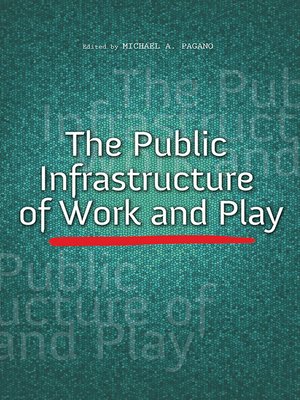
Sign up to save your library
With an OverDrive account, you can save your favorite libraries for at-a-glance information about availability. Find out more about OverDrive accounts.
Find this title in Libby, the library reading app by OverDrive.



Search for a digital library with this title
Title found at these libraries:
| Library Name | Distance |
|---|---|
| Loading... |
The latest volume in the Urban Agenda series looks at pressing infrastructure issues discussed at the 2017 UIC Urban Forum. Topics include: competing notions of the infrastructure ideal; what previous large infrastructure programs can teach the Trump Administration; how infrastructure influences city design; the architecture of the cities of tomorrow; who benefits from infrastructure improvements; and evaluations of projects like the Chicago Riverwalk and grassroots efforts to reclaim neighborhood parks from gangs.
Contributors: Philip Ashton, Beverly S. Bunch, Bill Burton, Charles Hoch, Sean Lally, and Sanjeev Vidyarthi
| Cover Title Page Contents Preface and Acknowledgments Part One: Overview "The 'Infrastructural Ideal': Expansive, Contested, Eroding" - Philip Ashton Part Two: White Papers "Infrastructure of Urban Play" - Charles Hoch "Planning and Financing Infrastructure in the Trump Years: What Can the Administration Learn from Previous Large Infrastructure Programs? - Beverly Bunch "The Built Environment: How Infrastructure Shapes City Design Today and Tomorrow" - Sanjeev Vidyarthi "The City Within and the Architecture Around: Architecture of Tomorrow's City" - Sean Lally Part Three: Synthesis "The Power to Move People: Public Art and Public Transit" - Bill Burton Contributors | "When a word such as 'infrastructure' means everything to everyone's hopes for jobs, urban progress, and quality of life it is time to be very careful, to dig deeper. That is exactly what this book does. It leads us to soberly reflect upon real meanings and true potentials."—Henry Cisneros, cofounder and chairman, CityView"In today's urban environment the distinction between the infrastructure needed to support services; production, work, and the physical foundation devoted to tourism; entertainment; and leisure has all but vanished. The essays in this volume explain the far-reaching consequences of this development."—Dennis Judd, coauthor of City Politics: Private Power and Public Policy
|Michael A. Pagano is Dean of the College of Urban Planning and Public Affairs and a professor of public administration at the University of Illinois at Chicago (UIC). He is a fellow of the National Academy of Public Administration, faculty fellow of UIC's Great Cities Institute, and editor of Remaking the Urban Social Contract, The Return of the Neighborhood as an Urban Strategy, Metropolitan Resistance in a Time of Economic Turmoil, and Jobs and the Labor Force of Tomorrow.







